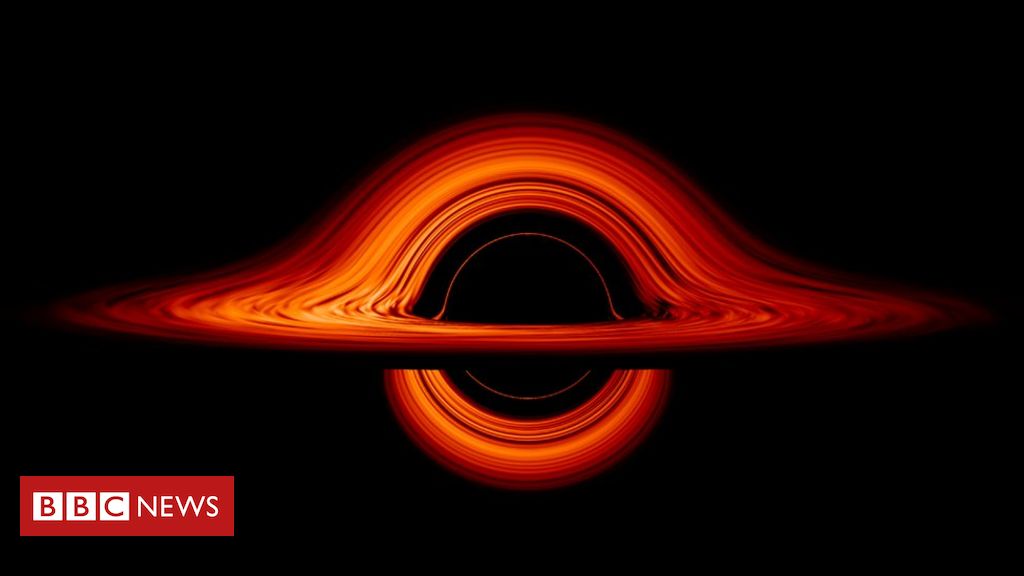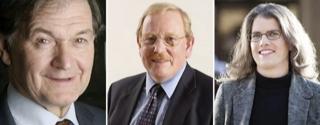Three scientists have been awarded the 2020 Nobel Prize in Physics for work to understand black holes.
Roger Penrose, Reinhard Genzel and Andrea Ghez were announced as this year’s winners at a news conference in Stockholm.
The winners will share the prize money of 10 million kronor (£864,200).
Swedish industrialist and chemist Alfred Nobel founded the prizes in his will, written in 1895 – a year before his death.
David Haviland, chair of the physics prize committee, said this year’s award “celebrates one of the most exotic objects in the Universe”.
Black holes are regions of space where gravity is so strong that not even light can escape from them.
UK-born physicist Sir Roger Penrose, from the University of Oxford, demonstrated that black holes were an inevitable consequence of Albert’s Einstein’s theory of general relativity.
- Listen to the BBC’s Life Scientific: Sir Roger Penrose
- Hepatitis C discovery wins the Nobel Prize
“The history of black holes goes way back in time to the end of the 18th Century. Then, through Einstein’s general relativity, we had the tools to describe these objects for real,” said Ulf Danielsson, a member of the Nobel Committee.
But the mathematics of these objects was incredibly complicated to understand, and many researchers believed they were nothing more than mathematical artefacts that existed on paper alone. It took researchers several decades to realise that they could exist in the real world.
“That’s what Roger Penrose did,” said Danielsson. “He understood the mathematics, he introduced new tools and then could actually prove that this is a process you can naturally expect to happen – that a star collapses and turns into a black hole.”
Sir Roger, he said, “laid the theoretical foundations to say: these objects exist. You can expect to find them if you go out and look for them”.
Penrose was born in 1931 in Colchester and comes from a scientific family. He is the son of the psychiatrist and geneticist Lionel Penrose and Margaret Leathes, who was the son of a well-known English physiologist.
In the 1950s, he came up with the Penrose triangle, an impossible object which could be depicted in a perspective drawing but could not exist in reality. This and other observations by Penrose’s father influenced the artist MC Escher, who incorporated them into his artworks Waterfall and Ascending and Descending.
Reinhard Genzel and Andrea Ghez provided the most convincing evidence yet of a supermassive black hole at the centre of our galaxy – the Milky Way.
They found that this huge object, known as Sagittarius A*, was tugging on the jumble of stars orbiting it.
American Prof Ghez, from the University of California, Los Angeles (UCLA), said: “I’m thrilled to receive the prize and I take very seriously the responsibility of being the fourth woman to win the Nobel prize [in physics].”
Reinhard Genzel, from the Max Planck Institute for Extraterrestrial Physics in Garching, Germany, and Ghez used the world’s largest telescopes to see through huge clouds of interstellar gas to the centre of the Milky Way.
Their discovery stretched the limits of technology and they had to develop new techniques to compensate for distortions to their observations caused by the Earth’s atmosphere.
Follow Paul on Twitter.
Previous winners of the Nobel Prize in Physics
2019 – James Peebles, Michel Mayor and Didier Queloz shared the prize for ground-breaking discoveries about the Universe.
2018 – Donna Strickland, Arthur Ashkin and Gerard Mourou were awarded the prize for their discoveries in the field of laser physics.
2017 – Rainer Weiss, Kip Thorne and Barry Barish earned the award for the detection of gravitational waves.
2016 – David Thouless, Duncan Haldane and Michael Kosterlitz shared the award for their work on rare phases of matter.
2015 – Takaaki Kajita and Arthur McDonald were awarded the prize the discovery that neutrinos switch between different “flavours”.
2014 – Isamu Akasaki, Hiroshi Amano and Shuji Nakamura won the physics Nobel for developing the first blue light-emitting diodes (LEDs).
2013 – Francois Englert and Peter Higgs shared the spoils for formulating the theory of the Higgs boson particle.
2012 – Serge Haroche and David J Wineland were awarded the prize for their work with light and matter.
- Physics
- Nobel Prize
Source: Read Full Article

